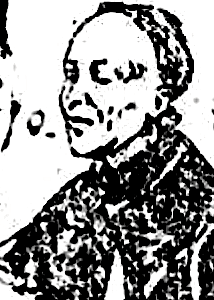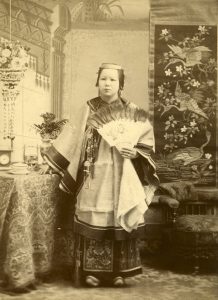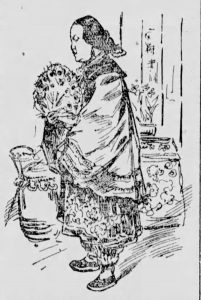
Figure 1: An illustration of Wing Sing in 1893 (This image is from “Sang Kee and Miss Chu See”. The Montreal Star, 20 Dec 1893, pg. 8.)
Very little is known about the early life of Montreal businessman Wing Sing (1860s-?). He was born in Canton (now Guangzhou), a city in Southern China that was heavily involved in foreign trade in the mid-18th century (Chapman 45; Po 143). Perhaps out of a desire to flee a region destabilized by wars or to pursue economic opportunities in the West that the foreign trade had acquainted him with, Wing Sing migrated to Canada probably before the imposition of Head Tax in 1885.
His early days in Canada also remain shrouded in mystery because of the paucity of reliable records and the commonness of his name. Archives housed by Library and Archives Canada (LAC) and contemporaneous Canadian newspapers mention more than a dozen Chinese men in Canada named Wing Sing . This number swells even further if we factor in the fact that most officials and journalists tended to transliterate Chinese names inconsistently (Rao xiii). As a result, variations such as “Win Sing,” “Win Shing,” “Wing Xing,” “Wing Hsing” etc. also add to the confusion when we try to disentangle our Wing Sing from the crowded archives. There were roughly six Wing Sings who lived in Montreal around the same period. They could be deduced to be different men sharing the same name because four of them were laundry shop owners working in different parts of the city while the remaining one—who was involved in a famous court case that obliged him to swear before a beheaded rooster—only changed his name from Sue Ming into Wing Sing in 1898 (“Chinamen”; “Ethics”; “Woo Joss”; “Advertisement”; “Pole”).
However, attending to these namesakes’ biographical details including their professions, eventual places of settlement, and associates can narrow down the number of men who might be our Wing Sing. By doing so, a focused—albeit narrow—portrait of Montreal’s Wing Sing as a successful merchant who settled in Montreal some time before 1891 emerges (“The Police Committee”). He is mentioned in Edith Eaton’s journalism as the manager of the Quong Hing boarding house on rue de la Gauchetière along with Sam Kee beginning as early as 1894 (Eaton, “Girl Slave”).
In addition to the boarding house on rue de la Gauchetière, Wing Sing also owned a laundry on Dorchester Street (now boulevard Réné Lévesque) and a shop behind St. Lawrence Market (“Novel Case”). Despite his success, Wing Sing remained vulnerable to the stereotypes of criminality that dogged early Chinese migrants. In July 1891, he was arrested, along with his wife, by Sergeant Bouchard because the sergeant suspected him of evading the Head Tax when he brought his wife to Canada (“The Police Committee”). However, he was released when he produced a certificate indicating that he had paid the tax at Vancouver (“The Police Committee”). To protect his reputation, he engaged the legal services of Messrs. Lighthall & Lighthall and sued the sergeant for his “false arrest” (“The Police”). Furthermore, in 1894, together with Montreal businessman Ho Sang Kee, he was also suspected of contributing to the clandestine operation that smuggled Chinese men over the US border (“Collapse”) (Chapman 45). While these suspicions were ultimately proved unsubstantiated (“Scharf’s Failure”), their lingering presence prompted prolonged media attention and scrutiny from officials who were “smiling in their sleeves at the denials” coming from these business partners (“The Smuggling”).
Despite lingering suspicion and hostility, Wing Sing and his wife actively participated in community works and were acknowledged to be “leaders of local Chinese society” (“Novel Case”). For example, in 1895, Wing Sing participated in an evening performance at the Emmanuel Church organized by Chinese Sunday school students and translated Rev. Mr. Silcox’s address into Chinese (“A Chinese Entertainment”).
Mrs. Wing Sing, as one of the only three Chinese women in Montreal in 1894 (Eaton, “Girl Slave”), also attracted considerable press attention. Reporters, informed by public fascination and stereotypes, focused on details such as whether her feet were bound. However, they also paid attention to her clothes, her jewelry, and the furnishings of her apartment. These details—as shown in the portrait and illustration below—give us a glimpse into the Sings’ private lives.

Figure 2: Mrs. Wing Sing Photographed in her Apartment (Mrs. Wing Sing and Son, Montreal, QC. McCord Stewart Museum MP-1984.44.1.1, dated 1895 )

Figure 4: An Illustration of Mrs. Wing Sing (This image is from “The Chinese Colony.” The Montreal Daily Star, 15 Jun 1895, p. 8.)
From the lack of Big Wing headdress (Liangbatou), we can deduce that Mrs. Wing Sing was Han, not Manchu (Hsu 11)—a fact that excluded her from the noble class and partially explained her willingness to emigrate to Canada (Elliott 77-78; 175). However, her elaborately embroidered underskirt, feathered fan, jade earrings, gilded porcelains, and embroidered table cloth and tapestry attested to the affluence of the Sing household, since most of these would have to be made by skilled artisans in Qing China and imported into Canada.

Figure 3: Mrs. Wing Sing and her Dog (Mrs. Wing Sing and her Dog, Montreal, QC, 1895, MP-1984.44.1.3)
Despite their good fortune, Wing Sing and his wife struggled for many years to have a child (“Color”). In 1903, with the help of Mrs. Joe Pong, they adopted a baby of Irish ancestry (“Color”) whom both parents doted on. They named him You Kang and both doted on him (“Novel Case”). Contemporary news reports noted that Mr. Wing Sing often carried him around in front of his shop near St. Lawrence Market so that they could enjoy the sunshine together (“Novel Case”). Writing a travelogue from the perspective of a fictional “Wing Sing” discussing his cousin’s adoption of a white baby, Edith Eaton similarly reported that Wing Sing and his wife often forgot “the rules of propriety” and gave baths to the baby together (Eaton, “Wing Sing”).
Sources:
“A Chinese Entertainment.” The Gazette, 27 Mar 1895, p. 3.
Advertisement for Wing Sing Laundry. The Montreal Star, 10 Sep 1904, p. 13.
Chapman, Mary, ed.. Becoming Sui Sin Far. McGill-Queen’s UP, 2016.
“Chinamen Fined.” The Gazette, 23 Oct 1900, p. 3.
“Collapse of a Sensation.” The Montreal Daily Star, 14 Jul 1894, p. 4.
“Color No Obstacle.” The Gazette, 24 Sep 1903, p. 3.
[Eaton, Edith]. “Girl Slave in Montreal.” Montreal Daily Witness, 4 May 1893, p. 10.
[Eaton, Edith]. “The Chinese Colony.” The Montreal Daily Star, 15 Jun 1895, p. 8.
[Eaton, Edith]. “Wing Sing in Montreal.” Los Angeles Express, 12 Mar 1904, p. 6.
Elliott, Mark C. The Manchu Way: The Eight Banners and Ethnic Identity in Late Imperial China. Stanford UP, 2001.
“Ethics of Wing Sing.” The Gazette, 30 Aug 1898, p. 3.
Hsu, Tung [徐冬]. Chi-Pao [旗袍]. Mercury Book Publishing [水星文化事業出版社], 2013.
Mrs. Wing Sing, Montreal, QC, about 1895. About 1895. McCord Stewart Museum, https://collections.musee-mccord-stewart.ca/en/objects/156240/mrs-wing-sing-montreal-qc-about-1895.
“Novel Case of Child Adoption.” The Montreal Daily Star, 23 Sep 1903, p. 6.
Po, Chung-yam. Conceptualizing the Blue Frontier: The Great Qing and the Maritime World in the Long Eighteenth Century. 2013. Ruprecht-Karls-Universität Heidelberg, PhD Dissertation.
“Pole Disliked Chinamen and Kicked in Thirty-Dollar Laundry Window.” The Gazette, 26 Sep 1913.
Rao, Nancy Yunhwa. “A Note on Chinese Names and Terms.” Chinatown Opera Theater in North America, U of Illinois P, 2017, pp. xiii-xiv.
“Scharf’s Failure to Prove.” The Montreal Star, 3 Aug 1894, p. 6.
“The Police Committee.” The Gazette, 6 Aug 1892, p.7.
“The Police Committee.” The Gazette, 7 Oct 1892, p. 2.
“The Smuggling of Chinese.” The Montreal Daily Star, 26 April 1895, p. 3.
“Woo Joss in Court.” The Gazette, 1 Sep 1898, p. 3.
